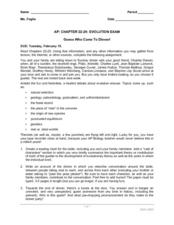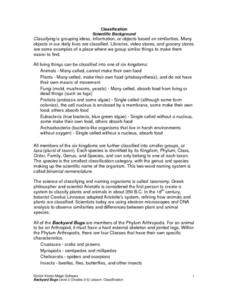National First Ladies' Library
How Do Flowers Get Their Names?
Students study Carolus Linnaeus and his classification system of plants. They examine the origin of both both common and scientific names of flowers. They speculate how their favorite flowers came to be named and brainstorm about the...
Alabama Learning Exchange
Classification
Students examine why scientists classify living organisms. They list and classify items they buy at the grocery store, sort and classify leaves, explore various websites, and write a biography of Carolus Linnaeus.
Curated OER
Taxonomy - The Science of Naming Organisms
Carolus Linnaeus designed the binomial nomenclature system of naming organisms that is still in use more than 200 years later. By viewing this PowerPoint, upcoming biologists learn how to use it. They are also introduced to the hierarchy...
Curated OER
Taxonomy
Biology novices name the seven levels of classification and use binomial nomenclature for naming living organisms. The first half of this presentation bestows a brief history of taxonomy, while the second half instructs on how to use our...
Curated OER
Organizing Life
In this taxonomy worksheet, learners learn about Linnaeus' system for classifying living things. Students complete 2 fill in the blank and 2 short answer questions based on what they read.
Curated OER
Classifying Living Things
In this classification worksheet, learners read a description of how all living things are related and describe a diagram showing how this taxonomy works. Students answer five questions related to their reading.
Curated OER
Everything in Its Place: Science Classification
Students investigate the system of classification for living things through the sixteen lessons of this unit. The five kingdoms of monerans, protists, fungi, plants, and animals form the basis of several experiments as the similarities...
Curated OER
Naming New Species
Young scholars explore science of taxonomy and the Five Kingdoms of life,
categorize organisms into Kingdoms, and create multi-media presentations illustrating knowledge of a Kingdom. They collect data and related pictures on the...
Curated OER
Guess Who Came to Dinner!
An exceptionally creative approach is taken to assessing your biologists' grasp of natural selection concepts. They are to imagine hosting Charles Darwin for dinner and having, to their surpise, a few other noted scientists crash the...
Curated OER
Flight for Survival - Avian Adaptations
Students create imaginary creature that has some of the adaptations birds have.
Curated OER
From Curiosity Cabinet to Museum Collection
Students study binomial nomenclature and museum-based research. They create a curiosity box, label the objects in their curiosity box , develop a classification scheme for the objects, and create a database of all objects collected by...
Curated OER
What Should You Know about Classification?
Many learners have a tough time picking out pertinent information from a text or in class. Sometimes, all it takes is a study/reading guide to show them the way. The worksheet here focuses on taxonomy and classification, including...
Curated OER
Classification: Dichotomous Key
Students investigate the classification process and nomenclatures used for classifying organisms. They study dichotomous keys to identify organisms with 90% accuracy. Students organize information regarding the relatedness of species.
Curated OER
Backyard Bugs
Explore the concept of scientific classification and the similarities and differences between plant and animal species. Your class will participate in hands-on activities by investigating dichotomous keys and classifying their shoes. To...
Project Food, Land & People
Loco for Cocoa
Students create a time line and map about how chocolate traveled the world. In this chocolate lesson plan, students also create and taste chocolate.
Curated OER
What's in a Name?
Students study the binomial system of naming organisms. They are given a name of an organism and they must draw a picture of what they think the organism looks like. Then they research the organism, find what it really looks like, and...
Curated OER
What's In A Name?
Students explore the concept of the binomial system of nomenclature for classifying organisms. Students travel on a field trip to observe organisms displayed and their common names. Students complete several classroom activities and...
Curated OER
"Chocolate" Reading Comprehension-- Informational Passages
In this reading for information worksheet, students read a one page text about the history and origins of chocolate. Students answer 5 comprehension and 5 vocabulary multiple choice questions.
Curated OER
Animal Classification
Learners are introduced to the concept of classification as it relates to objects, information, and characteristics. In this classification lesson, students research a variety of animals. Learners study the Linnaeus's system of...
Curated OER
Classification Schemes
Young scholars place organisms into the correct classification and justify their reasoning. They must include all objects and have a reason for their decisions.
Curated OER
Where Do I Belong?
Tenth graders study the diversity of life in the world. They classify and sketch organisms into the 6 kingdoms.
Curated OER
What is in a Name?
Students examine taxonomy and the use of dichotomous keys through two activities. They use a dichotomous key and create one of their own as well as create new scientific Family names for penguins using same word roots used by taxonomists.
Curated OER
What Kind of Insect is That?
Fifth graders characterize insects and classify insects according to the Linnaean system. They use hand lenses or microscopes to examine insect body parts.
Curated OER
What's In A Name?
Students create a binomial system of nomenclature for classifying organisms they encounter in a field trip to a natural history museum or from pictures in library books. They work in small groups to create accurate drawings and place...

























